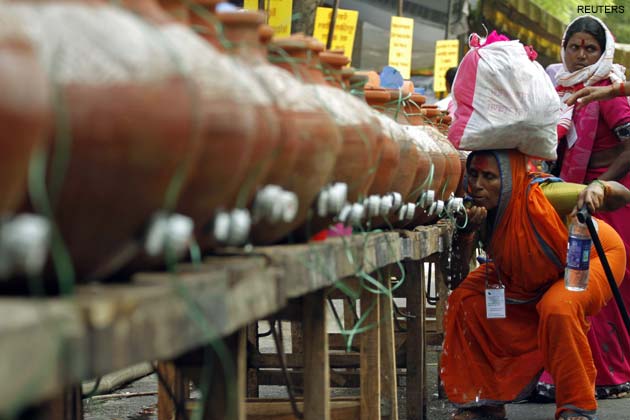
London, June 13: Policies that promote gender equality, safeguards against violence and exploitation and access to healthcare make Canada the best place to be a woman among the world's biggest economies, a global poll of experts showed on Wednesday.
Infanticide, child marriage and slavery make India the worst, the same poll concluded.
Germany, Britain, Australia and France rounded out the top five countries out of the Group of 20 in a perceptions poll of 370 gender specialists conducted by TrustLaw, a legal news service run by Thomson Reuters Foundation.
The United States came in sixth but polarised opinion due to concerns about reproductive rights and affordable healthcare.
At the other end of the scale, Saudi Arabia - where women are well educated but are banned from driving and only won the right to vote in 2011 - polled second-worst after India, followed by Indonesia, South Africa and Mexico.
"India is incredibly poor, Saudi Arabia is very rich. But there is a commonality and that is that unless you have some special access to privilege, you have a very different future, depending on whether you have an extra X chromosome, or a Y chromosome," said Nicholas Kristof, journalist and co-author of "Half the Sky: Turning Oppression into Opportunity for Women Worldwide", commenting on the poll results.
The poll, released ahead of a summit of G20 heads of state to be held in Mexico June 18-19, showed the reality for many women in many countries remains grim despite the introduction of laws and treaties on women's rights, experts said.
"In India, women and girls continue to be sold as chattels, married off as young as 10, burned alive as a result of dowry-related disputes and young girls exploited and abused as domestic slave labour," said Gulshun Rehman, health programme development adviser at Save the Children UK, who was one of those polled.
"This is despite a groundbreakingly progressive Domestic Violence Act enacted in 2005 outlawing all forms of violence against women and girls."
TrustLaw asked aid professionals, academics, health workers, policymakers, journalists and development specialists with expertise in gender issues to rank the 19 countries of the G20 in terms of the overall best and worst to be a woman.
They also ranked countries in six categories: quality of health, freedom from violence, participation in politics, work place opportunities, access to resources such as education and property rights and freedom from trafficking and slavery.
Respondents came from 63 countries on five continents and included experts from United Nations Women, the International Rescue Committee, Plan International, Amnesty USA and Oxfam International, as well as prominent academic institutions and campaigning organisations. Representatives of faith-based organisations were also surveyed.
The EU, which is a member of the G20 as an economic grouping along with several of its constituent countries, was not included in the survey.
Canada was perceived to be getting most things right in protecting women's wellbeing and basic freedoms.
"While we have much more to do, women have access to healthcare, we place a premium on education, which is the first step toward economic independence and we have laws that protect girls and women and don't allow for child marriage," said Farah Mohamed, president and CEO of the Canada-based G(irls) 20 Summit, which organised a youth gathering that took place in Mexico in May, ahead of the G20 leaders' meeting.
Experts were divided on the situation in the United States.
Civil rights and domestic violence laws, access to education, workplace opportunities and freedom of movement and speech were positive. But access to contraception and abortion were being curtailed and women suffered disproportionately from a lack of access to affordable healthcare, some experts said.
"Many of the gains of the last 100 years are under attack and the most overt and vicious attack is on reproductive rights," said Marsha Freeman, director of International Women's Rights Action Watch.
Barriers of development
It is more vital than ever to protect women's freedoms at a time of political upheaval in several parts of the world, some experts said.
"Times of political transition, we've learned the hard way, can also be times of fragility, and when rights for women and girls can be rolled back instead of advanced," said Minky Worden, director of global initiatives at Human Rights Watch.
Women's rights are particularly under attack in G20 host country Mexico, which ranked 15th in the survey. Mexico has a culture of male chauvinism, high rates of physical and sexual violence and pockets of poverty where healthcare and other services are no better than in some of the most marginalised communities of Africa, experts said.
Women are also victims of drug-related crime. Some 300 women were killed in 2011 in the violent border town of Ciudad Juarez with almost total impunity, said Amnesty USA.
"The violence affects men and women but often women disproportionately," added Worden. "Mexico is a place where law enforcement remains a challenge, and the government has an obligation to protect women, but often fails in that obligation, as it does to protect men."
Putting women's rights on the global agenda is the key to progress and to effective development, said Kristof. Countries that restrict women's rights and freedoms or fail to protect them from injustices will suffer long-term, socially and economically, he added.
While the poll was based on perceptions and not statistics, U.N. data supports the experts' views.
The Gender Inequality Index (GII), which looks at reproductive health, the labour market and empowerment of women through education and politics, named the same three countries as the worst places for women, although Saudi Arabia ranked the absolute worst in the GII, followed by India.
The GII, however, does not include gender-based violence or other elements such as the fact that many women carry additional burdens of caregiving and housekeeping.
When it came to what country was best, the expert perception did not match U.N. data. The GII ranked Germany, France and South Korea as the top three countries, in that order. Canada came seventh and the United States was in tenth place.
Activists were not surprised by the experts' favourable view of Canada, however.
"Having an understanding of Canadian culture and tracking the work they're doing around violence against women and gender equality, I believe that Canada really has been emerging as a model for what most countries should aspire to for a long time," said Jimmie Briggs, journalist, author and founder of the Man Up Campaign that works to engage youth to stop violence against women and girls.
How they rank: 1. Canada 2. Germany 3. Britain 4. Australia 5. France 6. United States 7. Japan 8. Italy 9. Argentina 10. South Korea 11. Brazil 12. Turkey 13. Russia 14. China 15. Mexico 16. South Africa 17. Indonesia 18. Saudi Arabia 19. India






Comments
Add new comment